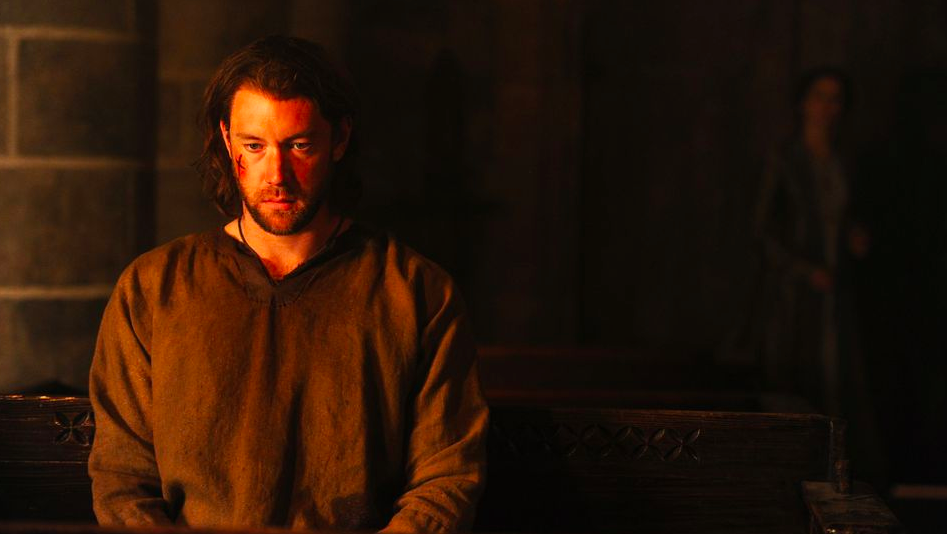
[For The Bastard Executioner‘s “Pilot” or any other recaps on Fetchland, assume the presence of possible spoilers.]
FX Summary:
Pilot. Wilkin Brattle, a warrior knight in the charge of King Edward I, trades his sword for a peaceful farming life — until the violence of his past finds him and forces him to pick up the bloodiest sword of all.
Have you been brushing up on your collected works of Shakespeare? Are you set up with tissues handy, prepared to shed an endless torrent of tears into your sad sack? Actually, you may want to invest in the family size box of tissues. A pack won’t cut it because The Bastard Executioner piles sacks of sadness on top of more sad sacks and so on and so on until an infinite abyss of sad sacks rolls with the credits. But hey, in their defense, this is 14th century England and it’s a safe bet that life pretty much sucked back then. In just one of many glaring examples of such realities, an initial scene introduces the Baron Ventris character grunting mightily on the toilet with his trusty butt cleaning assistant at his side, ready to wipe. Then two scenes later there’s a torture scene so gruesome you start think of Ramsey Snow (Ahem, Bolton) from Games of Thrones as a comedic character.
Wilkin Brattle, our main character, was a valiant warrior for King Edward 1st of England. After a horrific battle loss a child angel has Wilkin lay down his sword because Brattles “savior needs him to lead the life of a different man.” Then a few minutes later he’s sword-free and some sort of demon-dragon-type-fetus flies out of a dead soldier’s heart to attack him. Is Brattle dreaming? It seems so because then he awakens and life seems rather sunny all of a sudden with his glorious pregnant wife holding hands with him as they skip through meadows. It’s unclear if it was all a memory of what really happened. But what becomes crystalline quite soon is Wilkin’s intense need for vengeance on the English, specifically the Baron who rejoiced when Brattle and his men lost their battle against the Scots.
Meanwhile back at the shire, Wilkin works as a Che Guevara type, rousing the rebels and shooting flaming arrows at the taxmen sent to town by the devilish Baron. Then it turns out the scene with the angel and demon on the battlefield was five years ago but we never find out if it actually happened or was some sort of post traumatic delusion. The angel turns up again toward the end of “Pilot” but happens to appear alongside a character we know to be dead, so the jury is still out on the reality of the angel situation. Perhaps Wilkin represents a male Joan of Arc… the period for The Bastard Executioner is actually perfect for that to be the case because she was a 14th century warrior – just like Brattle.
The Baron who sent those taxmen with a mission to fleece the peasants of their pennies concocts his villainy alongside an advisor, Milus Corbett, (Vampire Bill from True Blood) a perfectly wicked right hand man. Meanwhile Baroness Lowry “Love” Ventris, the Baron’s mistreated wife empathizes with the rebels (her countrymen) while openly hating on Vampire Bill. After hearing of the attack on their tax collectors, the Baron and Vampire Bill ride out to the peasant village with their men in moonlight to seek revenge on the rebels. But when they get there it’s only women, children, and “useless elders.” So, they do as villains do and murder all of them anyway, including Wilkin’s pregnant wife, then burn their village to dust. But the corpses are somehow all still fresh and bloody on top of all the ashes. So we’ll be sure to see every bit of the grisly gore along with the rebels when they return home the next morning.
Thus, at the midpoint of “Pilot” Wilkin returns to town to find his own circle of hell waiting. His wife’s disemboweled body with fetus hanging out lies in wait seemingly on display in the center of a town massacre. Brattle now has nothing to lose and, filled with fury, prepares to wreak vengeance. He digs up some swords and swears to avenge the rebel families. Joined by BFFs, Toran and Berber along his band of morbid, rather than merry, men they journey to the Baron’s castle. On the way they meet the mysterious mystic, Annora of the Alders, played by Katy Sagal in a hayfield. She considers herself destined to help them with blood magic and a hooded mute played by her real-life husband and the show’s creator, Kurt Sutter.
Annora gives Wilkin a plan to secretly infiltrate the castle by replacing the executioner. We already know it’s “destined” to work out because the current executioner just got only half his wage and blew out of town with a serious case of crankypants. Before the executioner leaves he makes sure to beat his wife and child because, you know, gotta keep the cruelty and heartache of the story on task. The Baron and Bill (OK, Corbett) hear the rebels are approaching their castle area so they suit up, jump on their horses, and ride out to greet them. In the ensuing battle of yet another ghastly sword and axe fight scene with blood spurting and limbs flying off bodies, Wilkin and the Baron clash swords face to face. Finally Brattle takes the Baron down, punches his lights out, and then one of his morbid men kills the Baron with a stab through the back of the skull.
Before he died the Baron stabbed Wilkin deep in the gut, so here’s where having the witch who can do blood magic comes in handy. Annora marks his face with a cross brand so it looks just like he’s one of the Baron’s men. Brattle wakes up bummed out like a teen with a zit on prom night when he sees that new cheek in his sword’s reflection. Annora tells him the plan to replace the executioner and he’s all like no way until she reminds him of the angel from five years ago. This is her ticket into his trust (how could she know?!) so he goes with her flow from that convo forward and pretends to be the executioner. For his first step on this mission Wilkin brings the Baron’s body to the castle. The issue immediately arises whether or not he’s actually the executioner so they bring out the guy’s PTSD suffering battered wife for proof. Luckily Brattle is hot as well as kind and gentle, so he immediately bonds with her. The executioner’s wife takes one look at him and just goes with it. She calls him “my love.” Wilkin is indoctrinated into the executioner’s family and career track just like that… and then later that night in the chapel the Baroness seems to like him too.
Corbett’s dismayed by this effect the executioner seems to have on the womenfolk and probably wonders why he doesn’t seem familiar given that Corbett is a high level castle official and the executioner works for him. So when Wilkin says he’ll be moving on now Corbett insists he stay and continue to work for the castle. Keep your enemies closer it would seem. This means Brattle will be a palace insider, yes. But it also means he’ll be forced to execute the very people he seeks to avenge, innocent townspeople, as his new job.
Then right before the end of the infinite episode, Annora’s mute talks. Hold on! The executioner is not an executioner and the mute’s not mute. Next you’ll tell us the bastard’s parents were happily married upon his conception… But then the last scene initiates Brattle into his role as executioner and he truly becomes one when he raises the sword and does the deed. He’s inspired to the macabre task after he sees the cross his wife wore upon her death on a man in the crowd. What Wilkin doesn’t know is that this was the man who spared his wife and the one who killed her is unknown, even to us. At this point the audience has only seen killer’s dagger and not his face.
The Bastard Executioner starts off wearying and weepy with little hope for redemption. Clearly the Baron dying didn’t do the trick, so how many men should Wilkin have to kill in order to qualify for actual vengeance accomplished? Also, isn’t he tipping the scales by taking this employment which forces him to kill innocent peasants? Et tu, Robin Hood? So much carnage and brutality fly at us in this first bit of the show that we’re left with a raw, wounded feeling. It’s time for some hope around here in this renaissance festival of a town. Seems like their best chances for redemption in this story may come from the women characters, either Annora with her blood magic or Lady Love with her title as Baroness and empathy for the common man. That might be a reason to keep watching The Bastard Executioner but keep those tissues in tow just in case.
–Katherine Recap





